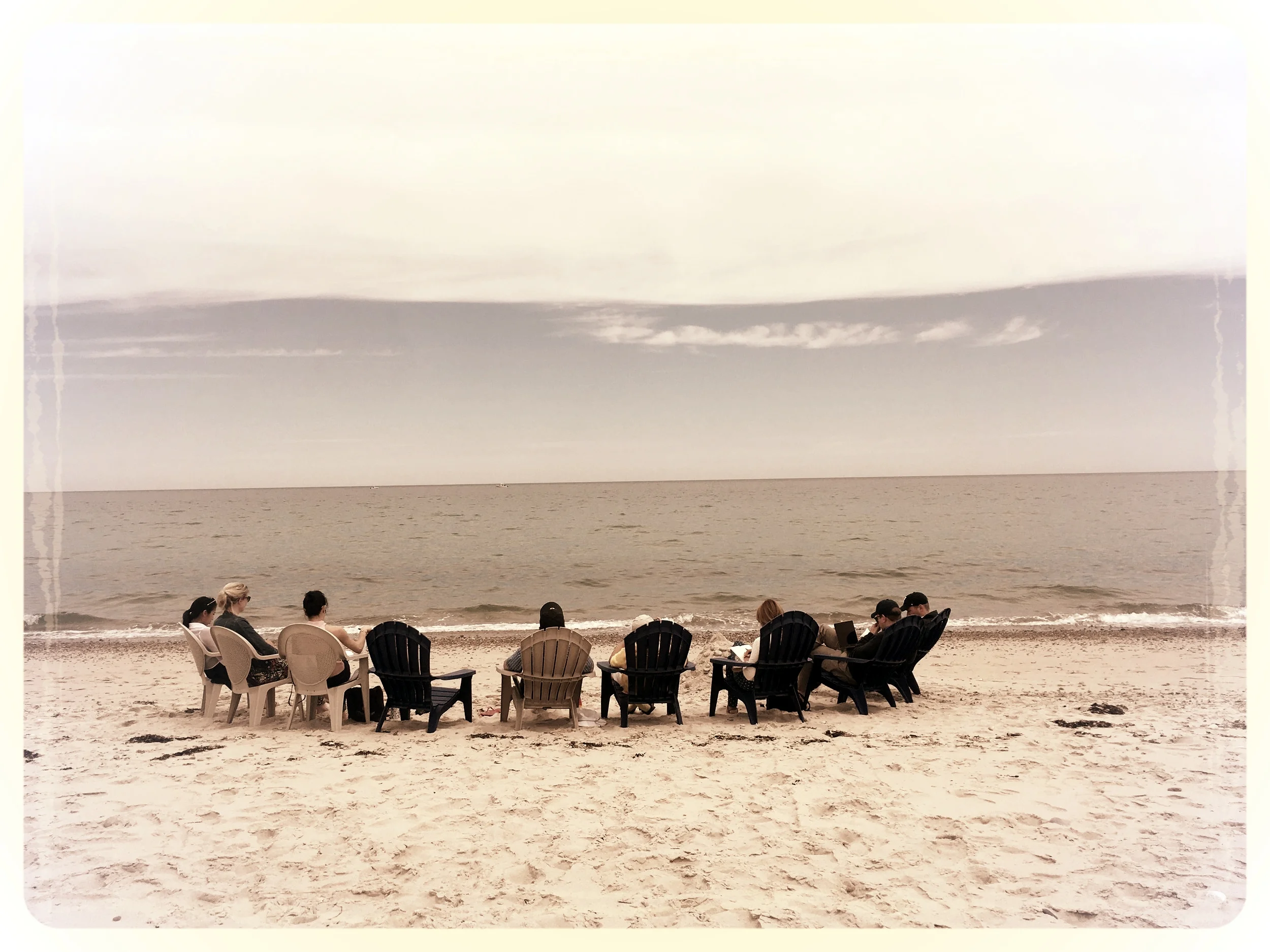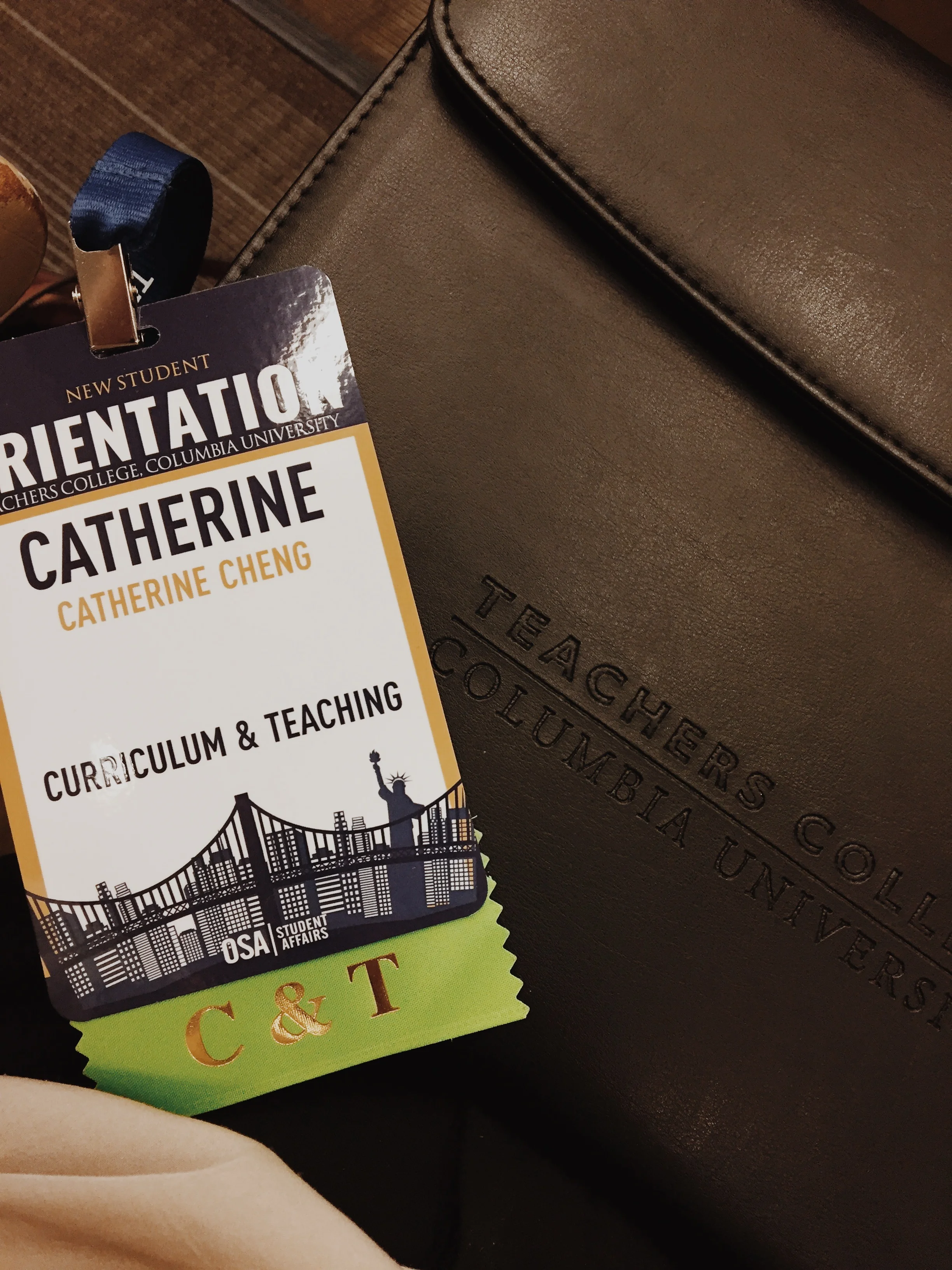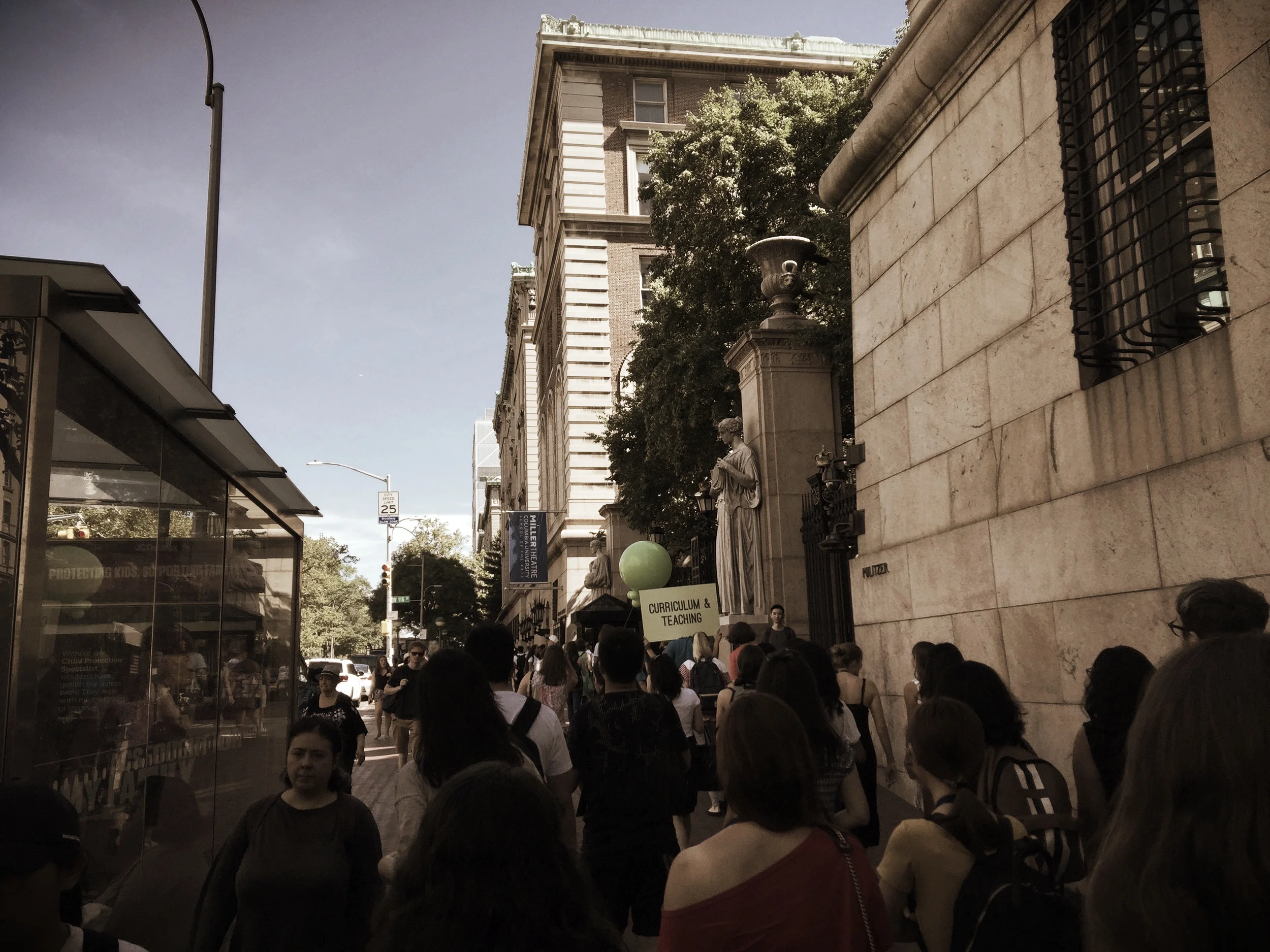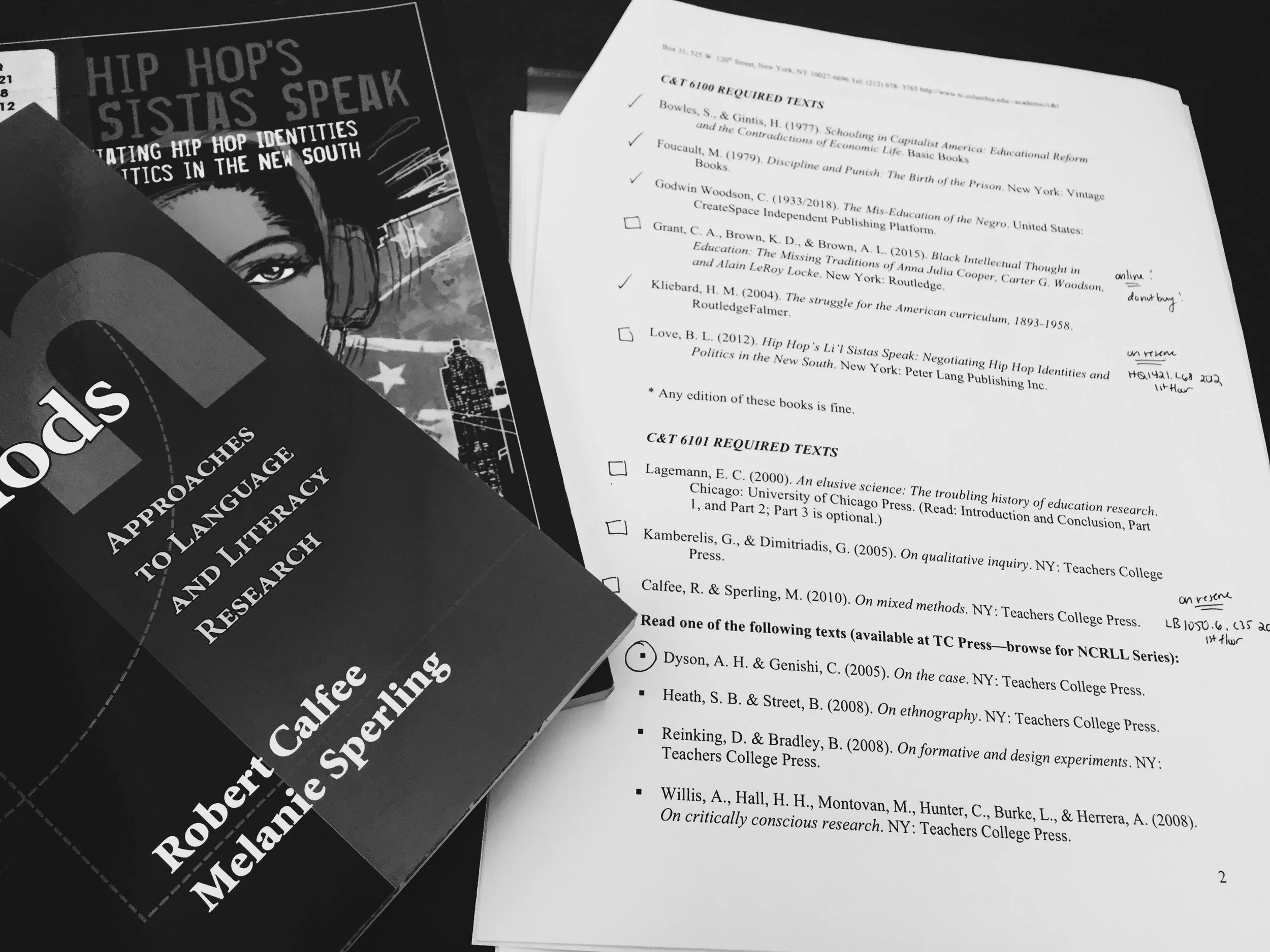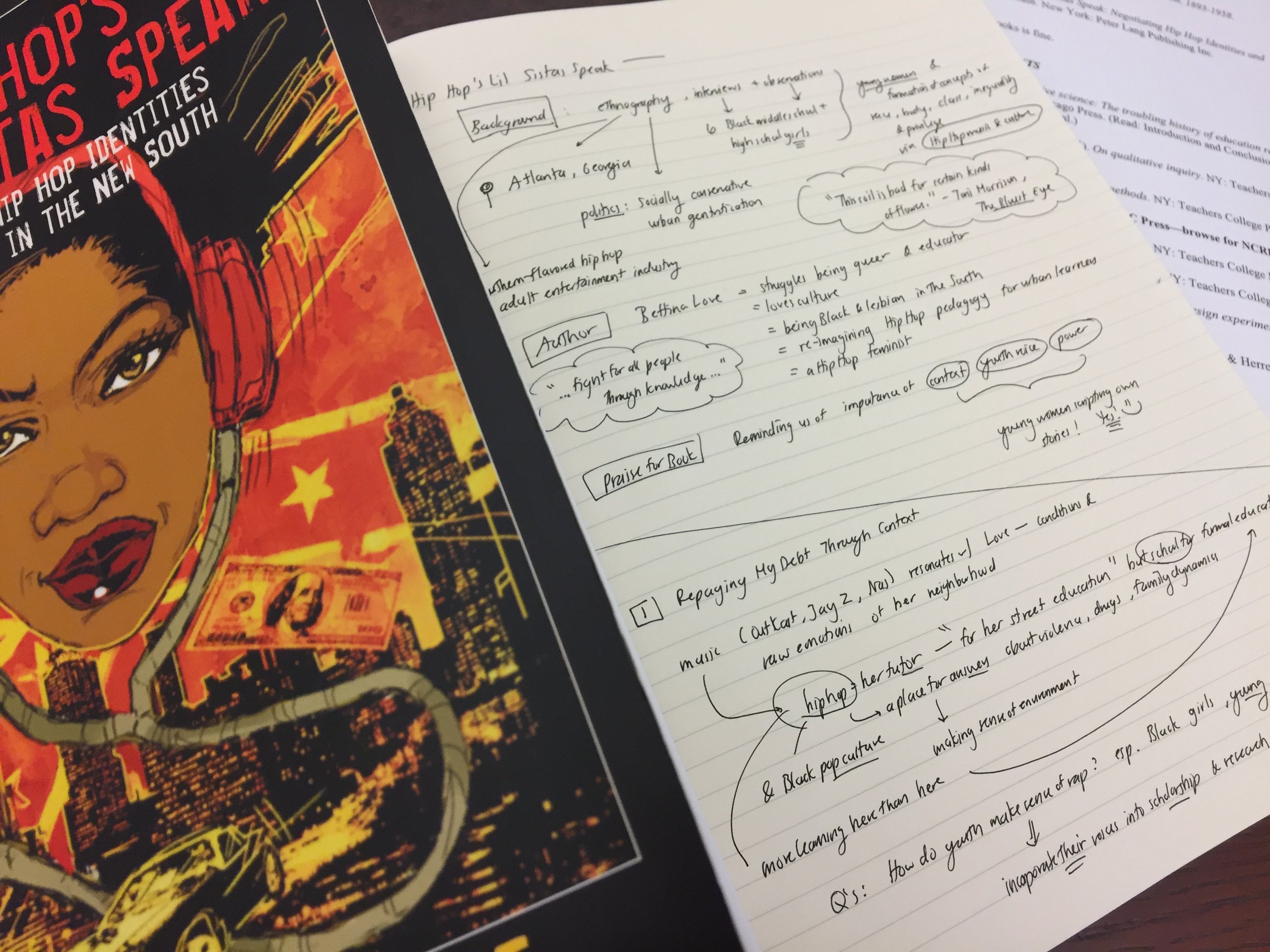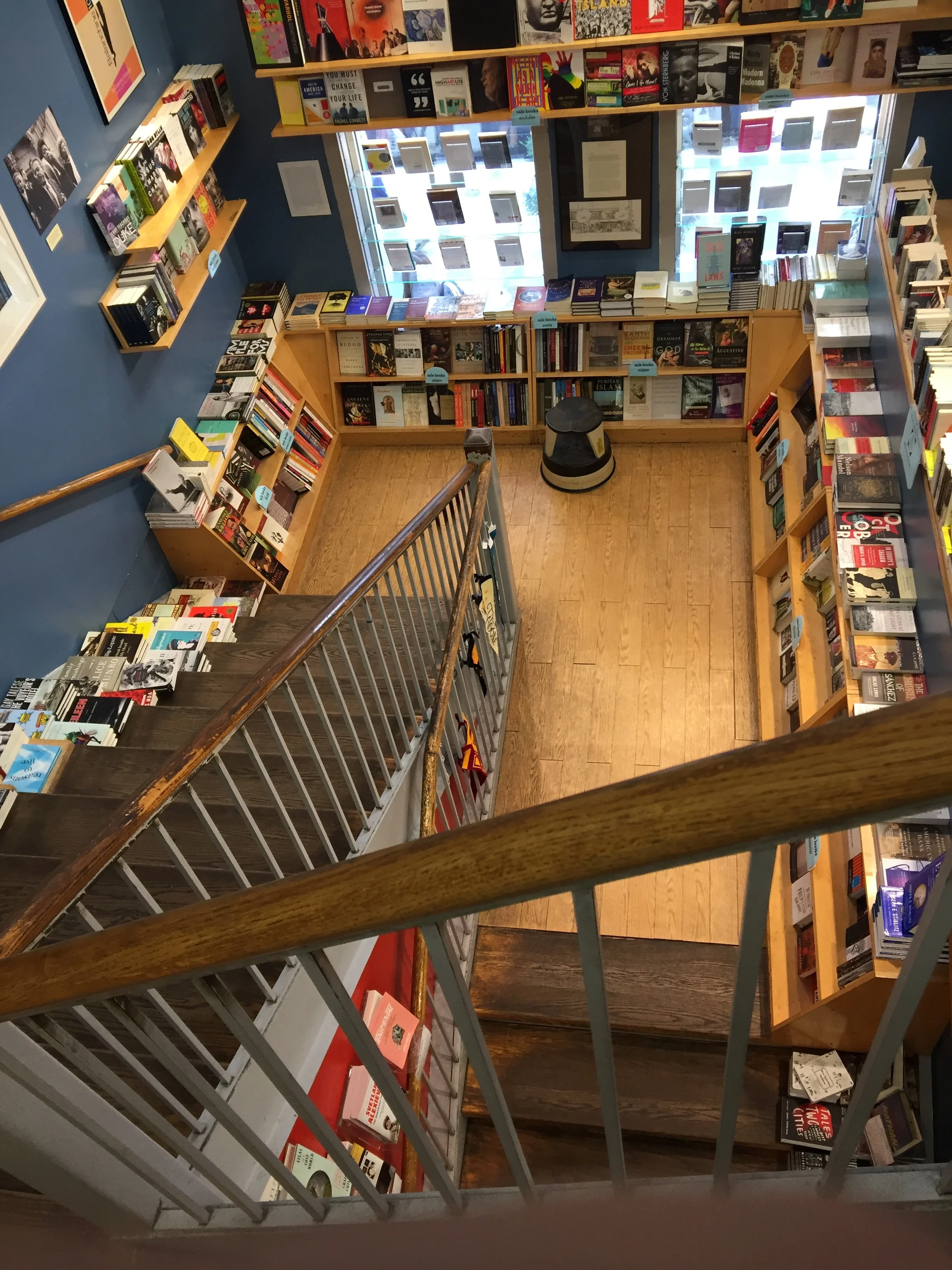“The purpose of life is to discover your gift.
The work of life is to develop it.
The meaning of life is to give your gift away.”
It is 10 pm on a Tuesday evening
as I'm starting to write this, but this Tuesday feels different. This Tuesday is September 4, 2018, and today was my first day back in school, but not as a teacher. Today, I became an official student again---a doctoral student in an Ed.D program in the Department of Curriculum and Teaching.
I always knew that I would be back in school; I did not know when, but I knew that further education is something I would pursue. Making the jump from a professional career in education to a formal program in education was relatively smooth. Once I set my mind to pursuing further education, I found the application process less daunting. My five years of teaching in a public high school have grounded me as an educator, exposing me to both the strengths and challenges of our current public education system. Although I took a more unconventional path and had my doubts initially, I believe I made the right decision to go straight into teaching after my undergraduate studies, rather than go for more formal studies. While working as a teacher, not only have students learned from me (based on the feedback they have given me), but also more importantly, I have gained insights and perspectives from them that will undoubtedly inform my studies and original research. Writing my personal statement for the doctoral program was no easy feat, as is expected for any kind of application writing, but throughout the whole process, I felt inspired and optimistic, with a renewed sense of purpose. I did not have this same feeling when writing my college application essays. As a seventeen year old, I was still trying to figure out who I was and what I wanted out of life. What makes me unique? What would I study? What career would I pursue afterwards? At twenty-seven years of age, when writing my personal statement, I decided to put myself more in the periphery, and to ask three different questions: What does our society need? What are my gifts? What experiences do I have that I can leverage to improve the lives of others?
I imagine that my life as a doctoral student will be quite different; yet, I expect other aspects to feel familiar. While I may not be officially teaching, I am a teacher who is learning and researching ways to make education accessible to all learners. In many ways, this is fundamentally a continuation of what many educators do on a daily basis. This is particularly true at my former school where every year, each teacher would conceptualize a student learning objective (which includes setting a performance target for students), create an action plan tailored to that objective, collect both qualitative and quantitative data, make sense of the data, revisit and potentially modify the action plan, and write up a mid-year reflection, followed by an end-of-year reflection paper/report describing our own growth in teaching practices, along with that of our students.
Making the transition from leading an adult life with a steady income to living a hybrid adult-graduate student life without a formal salary in an expensive city was more difficult to embrace initially. As a professional woman, financial independence and self-sufficiency are constantly on my mind. I was worried that, by going back to school as a full-time student rather than a part-time student with a full-time paying job, I would be jeopardizing both. Fortunately, I have been blessed with not having any lingering student debt from my time as an undergraduate student. Additionally, I have been awarded generous scholarships, along with a doctoral fellowship, that will help offset some of the expenses associated with studying full-time and living in New York City. I will be detailing my “money diaries” as a full-time graduate student in another post. For this particular entry, I would like to focus on my impressions from my first day of school/orientation, and how this first day compares with my first day of college (based on my recollection).
Let us start with some aspects that remain the same:
I may be older and a little wiser, but I am still pretty much the same person I was ten years ago---female, petite, Asian, and introverted. Soft-spoken and shy, I still have not developed an affinity for networking and impromptu socializing activities in large groups. However, I believe I am making strides! As part of the doctoral program orientation, each new student had to introduce him- or herself and answer the question of “Why are you here?” I initially panicked, not because I couldn’t answer the question, but because of the temporary anxiety I created for myself by thinking too much about how others would judge me if my response did not come out the way I intended. There was a 15-second pause, which felt like eternity, before a brave soul sitting four seats to my left volunteered to go first. I applaud her for taking that first step, because to go first is never easy. During those silent 15 seconds, I had tried to gather up as much courage as I could muster to raise my hand, but I was a few seconds too late. It was a relief to know that I wouldn’t go first; yet, at the same time, I knew that I would dread the countdown and that I would be too busy in my head, rehearsing what I want to say, to fully capture the introductions by my peers. My attention can only be divided in so many ways. When it was my turn, I spoke from my heart, which, as I have learned from experience, has always served me well. I am here to represent the introverted students in my classrooms---and in those across the nation---to learn and research ways to help empower them to find their voice and live up to their full potential as engaged citizens in our society. I am here to also continue to push my own boundaries as an introverted educator in our increasingly loud society. Soon, my turn was over. I could breathe normally again and let blood circulate back to my periphery. Sharing wasn’t so bad after all. In fact, it was better than I had expected. During the subsequent meet-and-greet, several of my peers came up to me to provide affirmation to my research goals. What an amazing feeling that was!
There was free food! I forgot that there would be complimentary breakfast, so I ended up having a second breakfast on orientation morning consisting of lots of coffee, fresh fruit cups, and muffins. In addition, there was a lovely luncheon in the courtyard area of Teachers College, where large white tents were set up, along with a live band. This brought back memories of Wellesley College. The music was helpful in terms of reducing the awkwardness of finding a place to sit and filling in the gaps in conversations with unfamiliar people. This struggle might totally be an “introvert thing” but is nonetheless one that I stress over.
There was a vibrant “student resources/activities fair” with current students staffing individual tables/booths, handing out flyers, pitching their organizations, and passing out goodies (like the usual pens, highlighters, notepads, and chocolates). While walking around campus, however, I did also receive vouchers for free shared rides (through “Via”). And in the morning session, I received a Teachers College faux leather portfolio (which you can use for networking at job fairs), which I found to be practical and thoughtful. Always take advantage of the freebies during orientation, and grab those handouts and brochures, because you never know when they will come in handy. Oh, and I signed up yoga classes (let’s see how long this commitment will last).
I frequently got lost navigating the hallways of the school. As I did ten years ago, I filled out my schedule into my weekly planner (but this time, did not color code the different classes), looked up the room numbers for my classes, and visited the classrooms in consecutive order to be prepared for the first day. Typical of my nerdy self, I also timed myself walking to each classroom from the main entrance to the school so that I know which trains/buses to catch to arrive on time. There are many advantages to living off-campus, but getting to class effortlessly is not one of them. My commute to school is just as long as my commute to work was when I taught in Connecticut. What’s more, just like my former commute, I have to account for delays (darn you, 1 train!).
There is a plethora of academic support if you know to seek it out. Just like at Wellesley College, Teachers College provides numerous supports starting on day one. I learned about the Graduate Writing Center (where I have a feeling I will be a frequent visitor), library services (such as research help), and the Office of Doctoral Studies. Furthermore, our program has a doctoral peer mentor, who encourages us to visit her during her office hours. I also plan to make use of other supports such as office hours with professors (these are scheduled online, in 15 minute slots), my faculty advisors, the course assistant for one of my doctoral seminars, and of course, the course reserves inside the library. When I was in college, I bought all of my textbooks (brand new, which was a mistake), but I saved money by not purchasing the study guides and solution guides. Instead, I would sign them out in the library in two-hour increments from course reserves. This is something I still do today, except there are no more study guides and solution guides to check out, only assigned books. I find that I can get more focused work done in two-hour increments in the library than in the same time in my apartment. For the readings I could not borrow at public libraries or did not purchase, I am utilizing the course reserves to get my work done.
How graduate school is different from college (so far):
One of the main differences in starting graduate school (compared with starting college) has been my renewed sense of purpose. I have always seen each new chapter in my life as a fresh start---an opportunity for me to work on something I couldn’t quite master before or be a different version of myself. The latter was one that I struggled with at the start of college, and it comes as no surprise because there is only so much you can change about yourself, personality-wise. Back in the fall of 2008, I told myself I would be more extroverted in general, more social at events, and more vocal in class. When this did not happen, I felt disappointed in myself for not trying hard enough, for not pushing myself enough. Like many introverted individuals, I equated being extroverted with being more successful in life, because how else would you get others to notice you and recognize your ideas? At Wellesley, I definitely felt the pressure to participate vocally in class, particularly in classes where participation counted for a grade. Those classes created some anxiety and took away from the joys of learning. At Teachers College, my first impression has been very positive, as even the school’s leadership team appears to have an understanding of and appreciation for diversity in its student population. Unlike ten years ago, this year I paid close attention to the talks given by the College’s president, provost, student senate president, professors, and so forth, listening attentively to the messages they were conveying and the personal insights they were sharing. I was deeply moved by their awareness of and commitment to social justice, ensuring that every learner has access to a proper education. Some people know to talk the talk, but not walk the walk; here, based on the personal anecdotes they shared, I had the feeling people did both. I also took comfort in knowing that some of the leaders of the College, including President Thomas Bailey, are introverts (based on my radar). Even as an adult, I keep looking for role models to look up to in my field, and to draw inspiration from. I believe I have found one or two such individuals already.
No more “syllabus days”? I received the syllabus for one of my doctoral seminars weeks in advance. I skimmed through it and what stood out was the substantial amount of required reading for each week, along with a long list of suggested readings. Now I understand why we, as incoming students, were asked to read ten books over the summer. Some of the new readings are excerpts from books; others are taken from journals. What I do appreciate about this syllabus is that the assignments are announced in advance and due dates are clearly indicated. As a planner, this is helpful for time management. As an adult, time management is particularly important because of the numerous responsibilities you have.
On a related note, there are no more textbooks to read, but instead a large variety of books providing different lenses through which to examine a topic or field. This makes sense because, as a graduate student, you are specializing in your field. As a doctoral student (with your Ph.D or Ed.D being a terminal degree), your focus is on becoming an expert in your given field. This is very different from the goals of college time, which is to explore, think outside the box, figure out your strengths, and hone your skills. While risk taking and exploration are still encouraged at the graduate level, if you don’t determine your research focus soon enough and stick with it, you may be in school for a very, very long time. Currently, I am reading dissertations (transformed into books), about French philosophy, texts providing historical context on school reform and educational theory, about qualitative research methods, and about the intersections of educational policy, curricular adjustments, and the U.S. capitalist economy. This is only a sampling :)
Academic writing is no joke here! Graduate student life is essentially consisted of two activities: reading and writing. And plenty of them! As a slow reader and a deep thinker (which slows me down even more), reading copious amounts is something I am nervous about. However, from attending some workshops this week, I have already learned some strategies that I will share at a later time. Academic writing at the graduate level is also quite different from the writing I did at the undergraduate level. At Teachers College, academic writing consists of five main types of papers: the response paper, the term paper, the literature review, the thesis, and the dissertation. The style that all of these papers follow is the APA style, where APA stands for the American Psychological Association. In college, I was aware of the APA style, but it was not emphasized. At most, I considered APA style when citing articles, but I do not recall writing and submitting papers in this style. At the graduate level, professors are very strict about adhering to this style of writing. Fun, fun! To prepare, I have already ordered myself the 6th edition of the official APA style manual---in hardcover, because I have a feeling I need this book to last me at least half a decade. Those of you currently in college, or preparing for college, pay extra attention to writing, and make use of those opportunities to improve your craft as a writer. Writing, after all, is one of the main modes of communication as an academic scholar. Write often, and write sincerely. Find your unique voice.
- You are matched with one or more faculty advisors at the start of the school year. At Wellesley College, I did not decide on a major and minor advisor until my junior year (or was it the end of sophomore year?). At the graduate level, you are assigned a faculty advisor early on based on your field interests and research direction. As part of any graduate school application, you are expected to look into the research of the school’s faculty to determine if you are a good fit for the department and vice versa. It is expected that you mention the name(s) of faculty with whom you would like to pursue research in your personal statement. In my college application essays, I did not mention any professor’s name. What is interesting is that faculty advisor meetings take place from day one of graduate school, if not earlier. A few months ago, I had already conference-called my two advisors to discuss my preliminary plans and class selections. Then, earlier this week, I met with one of them in person and have scheduled an appointment with my other advisor. Building a relationship with your advisor(s)/professor(s)/teacher(s) is important at every life stage, but especially key at the undergraduate and graduate level.
While many students are living on campus, I am living off-campus with Max. I had the option of living on campus, but Max and I decided on off-campus housing for both personal and financial reasons. This is definitely one of the main differences between college and graduate school. At Wellesley College, everything was centralized and taken care of for me, so that I could focus entirely on my academics. I did not have to cook (we had dining hall food, which was of high quality, in my opinion); I did not have to go grocery shopping; I did not have to commute (most of my classes were in the same building, the Science Center); and I did not have to manage my finances extensively. All of the above are now part of my daily life, particularly as one living off-campus. Instead of a single “boarding expense,” there are separate bills for everything---wifi, cable (which we opted out of this time), electricity and gas (combined in our apartment building), water, rent, etc. Some of these bills are paid with a credit card; others are paid through a direct transfer from my checking account. There is much more to keep track of. In sum, as a graduate student, your cost of living includes more lines than a college student’s cost of living.
All of my classes so far meet in the evening. In college, I scheduled most of my classes for the morning and early afternoon. This was typical for science classes, which almost always include a lab component. Occasionally, I had a few seminar classes that met in the evenings, but this was not until junior or senior year. As a first year graduate student, all of my classes begin at 5pm or later, with one ending at 9pm. This is a major adjustment for me, because I know myself and know that I am much more productive in the mornings than in the evenings. Why this difference, you ask? The reason is because many graduate students, particularly those in doctoral programs, work full-time jobs in tandem with taking classes. To accommodate their work schedule, most doctoral program classes take place in the evenings. This allows teachers to wrap up their lessons in their respective schools and to commute to class. Stressful? Absolutely! I genuinely respect my peers who are studying and teaching at the same time. Most of these teachers are pursuing their doctoral work as a part-time student, as a result. Since I am one of the few (or perhaps, only?) students in my doctoral cohort without a master’s degree, I decided to study full-time. Otherwise, it would take me nearly a decade to fulfill my doctoral requirement of 90 credits, along with my dissertation work. For reference, most classes are two to three credits each, full-time students take approximately 12 credits each semester, and most students in my program complete their dissertation in three-plus years. If you do the math, you’ll see why studying full-time makes sense for me, time-wise, but maybe not money-wise.
It is now Friday morning as I am wrapping up this blog entry. With time being so precious, I will be lucky if I can post one substantial entry every week on my blog. Welcome to my new world :)
As always, thank you for being part of my journey.
-Catherine
